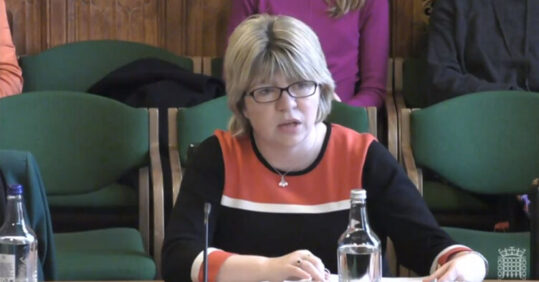Minister proposes wider range of vaccinators to address falling immunisation rates

Health minister Maria Caulfield has faced questions from MPs over the falling rates of childhood and adult immunisations.
The minister told the Health and Social Care Committee today (23 May) that boosting immunisation rates required a shift away from a general-practice-led system towards a multidisciplinary approach.
‘I think Covid was a game changer,’ said Ms Caulfield. ‘Traditionally it was either the GP or practice nurse [delivering immunisations]; now we’ve got pharmacists; we’ve got community vaccinators which were never around before.’
Related Article: New digital support for community nurses in 10-year plan
Also speaking before the select committee, Dr Nikki Kanani, deputy chief of the NHS Covid-19 Vaccination Programme at NHS England, said that while ‘the general practice is the key relationship with a family’, it was important to create more vaccination providers.
Dr Kanani commented that ‘our ability to diversify the offer, so you’re not just getting one vaccine by one provider in one place, is really key’.
‘We’ve seen that particularly with MMR catch up, so the more important that is, the more we’ll build that in going forward,’ she added.
Dr Kanani, who herself works in general practice as a GP in South East London, said: ‘I do like giving vaccinations because it’s nice to see families but actually the reality is we’ve got a lot of other things to do.’
Vaccination rates continue to fall post-Covid, particularly among children and young people.
Data from the UK Health Security Agency showed 7% fewer 13-to-14-year-olds in Year 9 were vaccinated against meningococcal disease, diphtheria, tetanus and polio, than the year before, and around 20% less were vaccinated than when compared with pre-pandemic levels.
Related Article: Nurse had to ‘freeze’ PPE during pandemic to re-use in care home, Covid inquiry hears
Vaccine hesitancy and vaccine confidence was identified as a key contributing factor to the continued fall in uptake with Ms Caulfield saying that a lack of trust in the MMR vaccination had ‘taken time to restore’.
‘We had issues around MMR where there was misinformation and disinformation for parents,’ she said.
‘But it is about getting those routine vaccines back onto people’s minds. And I think there was a lot of damage done around MMR, and that has, had a knock-on effect on vaccination rates for childhood vaccines as well.’
However, Ms Caulfield said that the issue was not just about confidence in ‘the vaccine itself’.
Related Article: Tell us what practice nursing means to you and potentially win £1,000
‘People have to feel a number of things to take part in a vaccination programme: they have to feel that that there’s a risk from the actual illness itself. And if they don’t feel that they’re at risk, they’re less likely to come forward for a vaccination,’ she said.
‘They have to feel as confident in the vaccine as possible, as well. And also, they have to have the ease of access to so in some communities.’

See how our symptom tool can help you make better sense of patient presentations
Click here to search a symptom




